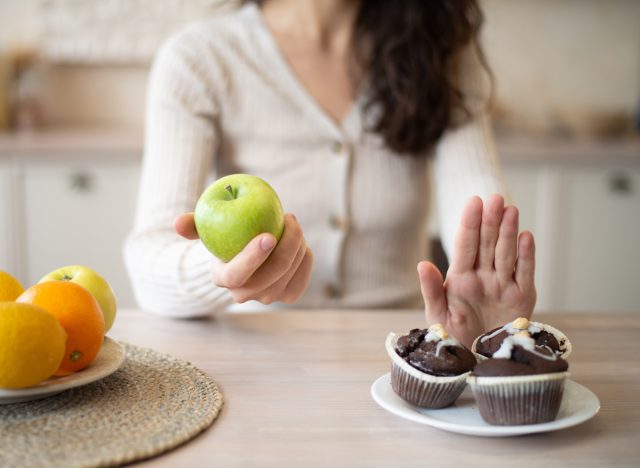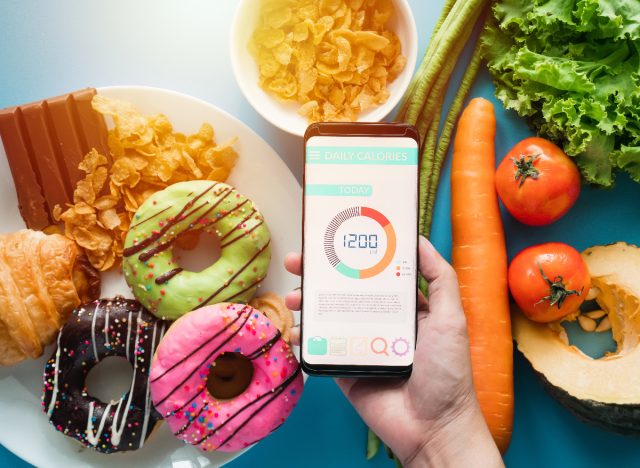Frosted donuts, warm chocolate chip cookies, and chocolate fudge ice cream—oh my! If you have a sweet tooth, you understand the struggle that is dieting. Although they look aesthetically pleasing on the outside, these sugary treats are detrimental to your weight loss progress and health.
Let’s get one thing straight: Incorporating whole foods with “natural sugar”, like fruit, in your diet is perfectly fine, Harvard Health Publishing explains; however, The issue arises when you eat more added sugar than you should. This is the kind of sugar that’s added to foods in order to boost their flavor and make them last longer.
“I strongly believe that the number one problem when it comes to health in this country right now is the crazy excess of added sugar in our food supply (and your diet),” Laura Burak, MS, RD, founder of GetNaked® Nutrition and author of Slim Down with Smoothies tells Eat This, Not That! “You don’t even realize how much sugar you’re eating, and it’s not your fault. Food companies disguise ingredients with healthier-sounding words like syrups, brown sugar, dextrose, glucose, sucanat, etc.”
We chatted with Burak to learn about sneaky ways you can cut out sugar for weight loss. Because in addition to the more blatant cakes and baked goods, sugar can be hiding in the most unexpected places! Keep reading to learn all about how to cut back on sugar, and next, don’t miss The 5 Worst ‘Empty-Calorie’ Foods Making You Gain Weight Faster.

“Swap in foods that contain natural sugar, nutrients, and antioxidants, like fruit, instead of added sugar like cookies, candy, and ice cream,” Burak suggests.
As previously discussed, consuming foods with naturally occurring sugars is not an issue. According to the American Heart Association, anything that has fruit or milk in it will have at least some natural sugars.

If you want to sweeten things up a bit, you still can—in a healthy way! Burak suggests adding cocoa powder or cinnamon to your cup of joe; vanilla extract and fruit to your homemade smoothies; or your favorite kind of nut butter to dates for a tasty treat.
“Find ways to use foods that have hints of sweetness and with time, your tastebuds will change, and you won’t like that super sweet taste anymore. Pretty cool when that happens,” she says.

Sweetened beverages are filled to the brim with sugar, so Burak says to wean yourself off of sports drinks, soda, your favorite coffee shop beverages, and even juice.
“You would be shocked at how much added sugar is in just one drink, so start by limiting these drinks and stick with mostly water, club soda, and unsweetened teas and coffees,” she explains.

“You wouldn’t believe all the sneaky sources of added sugar in your food,” Burak says. She stresses the importance of reading the ingredients on food packaging first and foremost, “no matter what healthy-sounding words are plastered on the box.” Be mindful of any sneaky words that actually mean sugar, and opt for brands that don’t have any added sugar (or contain minimal).
According to the American Heart Association, some additional names that translate to added sugars on food labels include brown sugar, honey, raw sugar, molasses, syrup, fruit juice concentrates, corn sweetener, invert sugar, and malt sugar.

“Focus on adding quality food,” Burak says. “I’m not talking gummy bears. Let me explain.”
Picture 500 calories worth of frosted donuts, and compare that to 500 calories of whole foods that are chock-full of nutrients, such as a freshly chopped green salad with eggs, avocado, seeds, and olive oil. These two ways of consuming 500 calories are most certainly not equal. In fact, your body will process them both differently, Burak says.
“The donuts are mostly made up of added sugar and saturated fat and void of any satiating, blood-stabilizing protein which is why one donut can easily lead to three,” she adds. “This food will not only increase your blood sugar, but it won’t keep you full or satisfied which will then lead to hunger and cravings.”
Alexa Mellardo

